In early 2016, John Hebard and his wife Laura realized they were caught in a vicious cycle that many Americans have found themselves in, stuck in an endless rat race working jobs that were really only doing one thing for them, helping them pay the rent.
They realized this was no way to live, so they sold everything, bought a truck and a 41-foot fifth wheel trailer, and headed out for life on the road.
Hitting the Road to Find a Better Way to Live
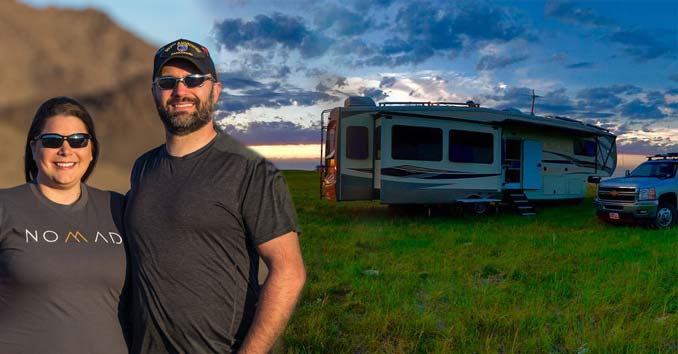
Can you tell us a little about yourself and your lifestyle?
I’m a medically retired Infantryman. After 8 years in the Army and 3 deployments, two of which were invasions, I went civilian. I got married, found work, went to school and earned two degrees in law enforcement. Work, school and “Call of Duty” kept my mind off the PTSD and emotions at bay, but eventually, normal life began to crack, and my marriage was suffering. I missed traveling, the adventure of living day to day, and the community I had in the Army. Realizing we were happiest on vacation, we sold everything, bought an RV and hit the road full-time.
What is life like out on the road?
My wife Laura and I began documenting our adventures on YouTube, and through this, we met many other full-time RVers. It’s a very large community of mostly wonderful people.
Life can be harder in some respects though; for example, most people have never had to deal with their own sewage! On the other hand, I no longer have to keep up a lawn and deal with an HOA. I feel it’s a fair trade.
Also RVs are notorious for mechanical failures. You’re always having to fix something! You need to be handy to live this lifestyle, or else independently wealthy. Most people can learn to be handy along the way, so you can save money by doing your own repairs, which is actually really satisfying. Having some experience and tools – for automotive, electrical (12v and 120v), woodworking, and plumbing – comes in handy, and you’re never far from a hardware or auto store to pick up tools and parts you may need. Most of us are ‘YouTube certified’ master techs.
You never know where the RV life will take you. We see all kinds of places on our travels, and meet all kinds of people. One day, we were contacted out of the blue by a film producer interested in telling the full-time RV story in a documentary style film. He found our YouTube Channel, watched our videos of the ups and downs of life on the road, and liked our story.
One thing led to another and we were cast in RV Nomads – the Movie, an independent, full length feature film premiering October 20, 2018 at a theater in the middle of nowhere – Wellington, Texas – about 100 miles from Amarillo.
I had the opportunity to learn hands-on, what it takes to make a movie and worked on production as lead grip and third cameraman. We shot the movie with about 20 other cast and crew members in Wellington, Texas and Salida, Colorado from May – July, and learned so much. It really was a great experience, so it will be amazing to watch the movie on the big screen this weekend at NomadFEST – an event where 500 RVers are getting together to boondock for 4 days. There will be concerts, BBQs, seminars and a conference, and of course, we are all there to watch the RV Nomads film premiere. As an independent film, it won’t be in major theaters, but you will be able to stream it for free online from November 15. You can find out more at: www.rvnomadsthemovie.com
It’s mind blowing how many successful people we’ve met on the road that are really grabbing life by the horns and making it what they want it to be. We so rarely meet anyone that’s bored or depressed, I actually can’t remember the last time. Show me a cul-de-sac in suburbia where you can say the same!
Can you tell us about your RV and how tou have customized it to fit your lifestyle?
Our RV is a 2016 41-foot Forest River Cedar Creek 36CKTS fifth wheel. We’ve customized it by adding a large solar and battery system, weBoost Drive4G-X cell booster, TPMS system on the tires, heavy-duty stairs, and four different water filters.
We pull it with a 14 Silverado 3500HD 4×4 long bed. I’ve customized it by switching to AT tires on the rear, installing a 45-inch curved lightbar on the front bumper, a 40-gallon gravity fed AUX tank in the bed, a 15cf tool box between the fuel tank and hitch, 20k fifth wheel hitch, I wired it for a CB (I just have to find one that will fit inside), diesel tuner, upgraded all shocks, put bike racks on the roof, and changed all oils and grease to full synthetic, which gets noticeably better mileage.
Another noteworthy upgrade was having all eight tires filled with nitrogen, which handles rapidly changing temperatures and elevations much better.
Tell us about your rig? How do you power your 5th wheel, what do you do for water, heat, and communications?
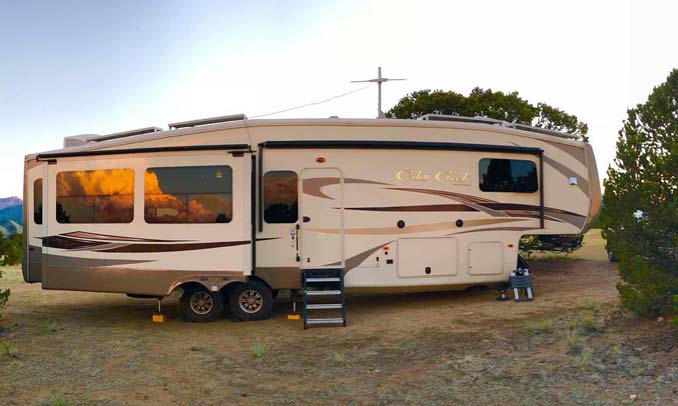
We love boondocking and staying off-grid, so we installed eight High Tech 200w panels on the roof for 1600w of solar. We wired them into two sets, front, and rear in case of shade. Each set runs into a Morningstar Tristar 45-amp charge controller. We chose four 815-amp hour Full River L16 AGM batteries for power storage. Finally, we installed a Magnum 3000w hybrid inverter/charger. The Magnum is run to the right side of my breaker panel. We shuffled the breakers around to only have the systems we want powered while boondocking on the inverter. It was easier than buying and mounting a sub panel.
For water, we have an Aquatank II 65-gallon water bag and 12v transfer pump to refill without moving the RV.
We have two small electric space heaters and the built-in propane heater. Our batteries hold enough that we can run electric heat only if it’s above 55 outside. Below 55 we’ll run propane as needed. We’re currently looking at a more effective propane heater.
We’re currently working on upgrading comms. I’ve installed the weBoost cellular booster, but we still need WIFI hotspots from Verizon and AT&T to fill in T-Mobile dead zones. I also need to find a CB that will fit in the cab; my truck is very tight.
When you’re not driving, where do you park the trailer and how long do you typically stay?
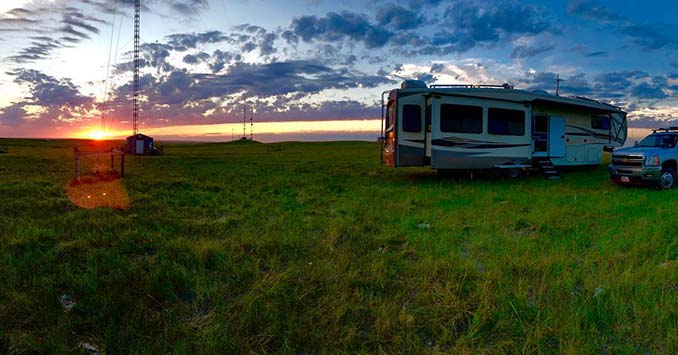
We prefer to stay on public lands. We find the Bureau of Land Management (BLM) and US Forest Service are usually the best. However, we’ve also found many free state parks. The length of stay all depends on why we’re there… Sometimes it’s an overnight, other times we stay for the full two weeks allowed; then we move on.
Does anyone ever bother you out on the road?
We’ve never had anyone bother us directly. However, a friend of mine was attacked by some off-leash dogs on BLM land earlier this year. When she confronted the dog’s owner he shoved her and started yelling at her, and I had to intervene. Otherwise, we generally find boondocking to be safe and very peaceful. Most people stick to themselves.
Do you have emergency backup plans for bad weather or anything else that may go wrong?
We carry an emergency NOAA weather alert radio. It will sound an alarm when certain weather warnings are announced. I like that we’re able to program it to only alert us to what we want to know about. Then it’s not going off all night for thunderstorm warnings.
If there’s a tornado threat, we’ll leave the RV in a heartbeat and seek a hard-sided shelter. The RV is insured for a reason.
As for other “stuff” that could go wrong I have several friends from the army I’ve made plans with. I’ve also stored extra supplies in multiple locations around the country.
Can you provide some tips for people who are thinking about doing the same thing?
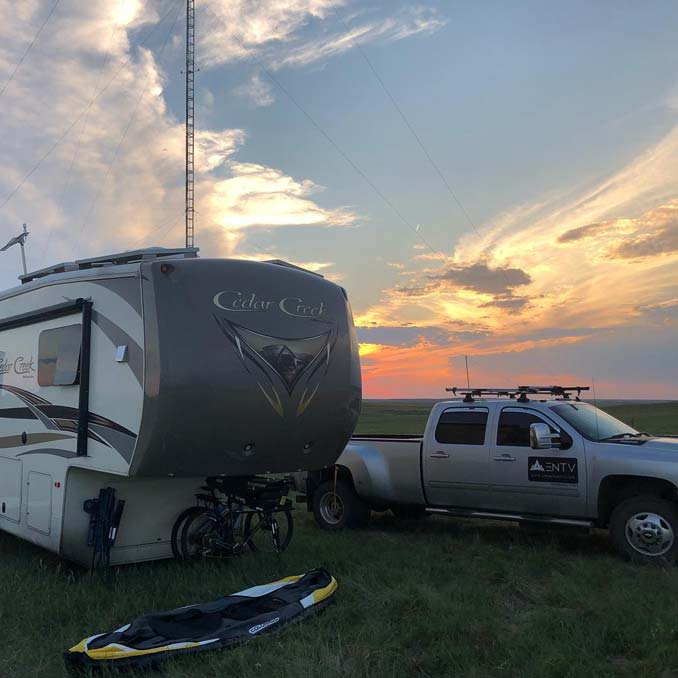
If you think full-time RV living is too expensive, I’ve got news for you. We’ve met many full-timers living out of older rigs they paid cash for when they sold their houses. Spend a few thousand on solar, and you can live for free on public land much of the time – within their rules of course. Once you eliminate your mortgage/rent, you don’t need to make nearly as much money to live. A lot of people stay in full-time jobs working hard to pay for stuff they don’t even need, which can make you feel chained down. When you realize you don’t need all that stuff, you can begin to explore new ways to find your freedom.
What effect has the RV lifestyle had on you and your family? Can you still have a social life out on the road?
We’ve made more lifelong friends in the last two years of RVing than we’d made in the previous 20 years. I’m shocked at how many wonderful people we’ve met on the road. I doubt I would have met half as many amazing people if I’d lived the rest of my life in suburbia. I can be working on my truck in an RV park and get several offers for help from complete strangers! Since many RVers are seniors and have been RVing for a decade or more, I’ve learned it’s worth listening to what they have to say. I love how I can meet a total stranger and sit down for an hour swapping stories about lessons learned along the way. I find them eager to share their knowledge and experiences.
What are some of the challenges associated with living in such a small place?
The biggest challenge is choosing what to bring. Unlike a house, you have a finite amount of space to store things. And to make matters worse, RVs can only hold a certain amount of weight, so you need to stay mindful of what you carry with you and focus on what’s most necessary to you.
Living the RV life shows you what’s really important and how to live minimally without needing or wanting so much worthless stuff. It gives you freedom from over-consumerism and teaches you to live more simply.
What kind of challenges have you faced, and if you had to start over is there anything you would do differently this time?
Our first RV, which was purchased brand new, was a lemon that had to be returned to the factory for two months of rebuilding. It’s doing much better now we have worked through a lot of the “issues,” but I wouldn’t change a thing… The Lemon RV video series we made has helped many other RVers, it grew our YouTube channel, and ultimately led to landing our role in the RV Nomads movie!
How do you work from the road?
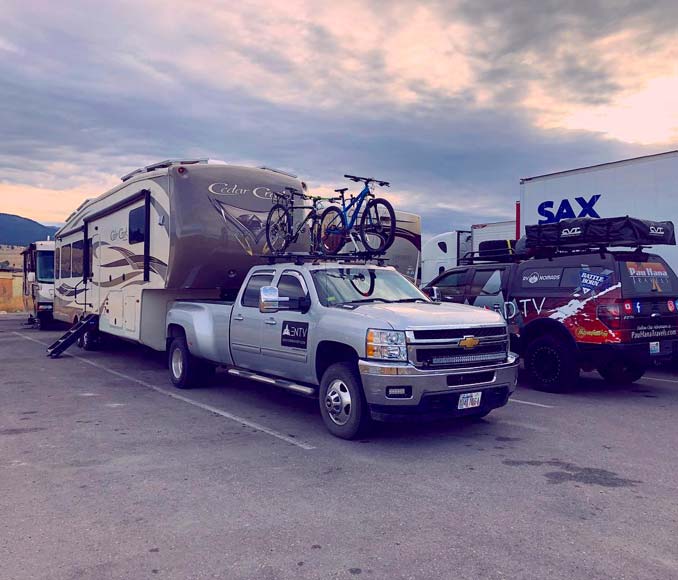
I’m a medically retired disabled vet, so that accounts for most of our income. We also run a YouTube channel about RV life and traveling called Hebard’s Travels, and now we’re working on the RV Nomads’ film project.
If you want to go full time, it’s really best to find a line of work you can do from the road and ensure you have a steady income stream first. Then find a side hustle and work on something you’re passionate about, like documenting your adventures and life on the road through photos, video, music or words. You’d be amazed at the opportunities that can arise.
You can really work from anywhere, as long as you have a WiFi signal. I read that by 2020, 50-percent of the U.S. workforce will be comprised of freelancers, and by 2022 the mobile workforce will account for 42.5-percent of the worldwide workforce. This new self-employed economy favors alternative living spaces over the “McMansion” obsessed buying culture of the American homeowner.
The RV Nomads cast represents 15 different couples and individuals who are successfully RVing, so I suggest watching the film for inspiration if you’re considering life on the road! You can watch the movie for free online from November 15 at www.epicnomadtv.com.
Do you have any final words of advice for those looking to either go off the grid or do something similar to what you are doing?
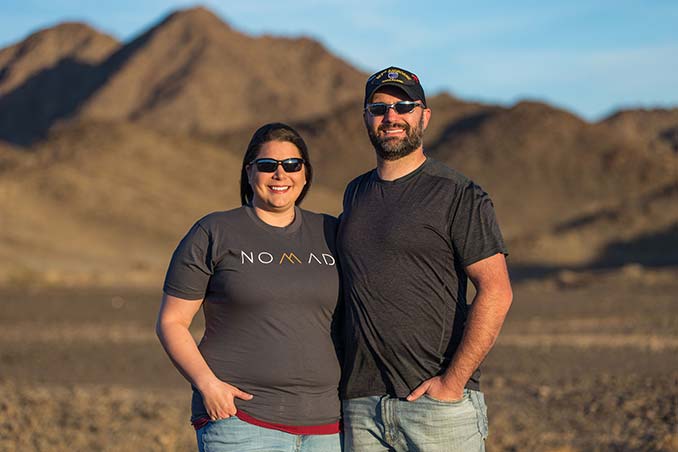
My best advice is start downsizing today. If you think you want to live in an RV, getting rid of the extra stuff is the first step. Once that’s done everything else can be done rather quickly. Only buy items that are multi-purpose. Due to your RVs space and weight restrictions, items that can be used in multiple applications are key.
Anything you wished you had learned or studied before going off the grid? Or that you would have gone back and done differently before going off the grid?
I wish I’d learned more about boondocking, solar and camping for free on public lands before we started. Staying off the grid in our first year would have saved us a ton of money and stress. I’m just glad we figured it out in our second year. Camping on BLM land in the middle of nowhere is so incredibly peaceful and quiet. It’s really taught me how to relax and calm down. Both of which have directly helped my PTSD recovery and marriage.




Thank you for writing such a wonderful article, I appreciate you picking our story.
Looks like fun but I dont think I could afford that kind of life style.
Awesome Article John!! Enjoyed reading it and picked up several ideas of course. Thanks!
While this may be fine in the short term, I would not recommend full time traveling for a long-term strategy. When a bad SHTF situation hits, it will be critical to have established friendships with neighbors & know who you can count on. When the world as we know it ends, people will not trust strangers & travelers. Travelers will be treated as outcasts, & you will truly be on your own. & only a limited amount of food can be stored in an RV. Please, for your own safety & longevity, live in one place & build friendships with your neighbors, extended family & a survival group if possible.
You may have missed his comment in the article – “As for other “stuff” that could go wrong I have several friends from the army I’ve made plans with. I’ve also stored extra supplies in multiple locations around the country.” Plus, John has thousands of current and former military brothers and sisters all over the country he could call on during a SHTF situation. It’s what we do for one another. Vets Helping Vets. That’s something someone who has never served probably doesn’t understand.